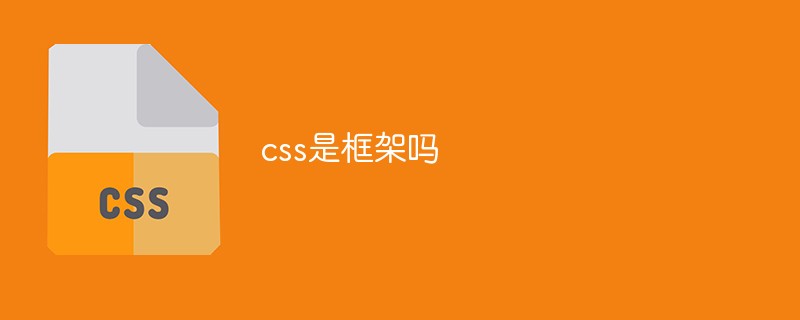Home >Web Front-end >Front-end Q&A >Is css a framework?
Is css a framework?
- 青灯夜游Original
- 2021-07-05 17:34:112608browse
CSS is not a framework, but a computer language used to express the style of files such as HTML or XML. It is a style language that can separate web pages and content and is used to control web page styles; CSS Not only can web pages be statically modified, but various elements of web pages can also be dynamically formatted using various scripting languages.

The operating environment of this tutorial: Windows 7 system, CSS3 version, Dell G3 computer.
CSS (full name: Cascading Style Sheets, Cascading Style Sheets) is a computer used to express file styles such as HTML (an application of Standard Generalized Markup Language) or XML (a subset of Standard Generalized Markup Language). language.
CSS is a markup language used to control the style of web pages and allows the separation of style code from web content. Simply put, the introduction of CSS is to make the HTML language better adapt to the art design of the page.
CSS is based on the HTML language and provides rich formatting functions, such as fonts, colors, backgrounds, and overall layout. Web designers can set different styles for various visual browsers, including Monitors, printers, tablets, mobile phones and other mobile devices.
CSS can perform pixel-level precise control over the layout of element positions in web pages, supports almost all font size styles, and has the ability to edit web page objects and model styles.
The development history of CSS
In the early 1990s, the HTML language was born. Early HTML contained only a few display attributes to set the effects of web pages and fonts.
With the development of the Internet, in order to meet the increasingly rich web design needs, HTML continues to add various display tags and style attributes, so this brings a problem: the mixed use of web page structure and styles makes the web page code become It's chaotic, code redundancy increases bandwidth burden, and code maintenance becomes miserable.
Hakun Lee proposed the original proposal for CSS in early 1994. Bert Bos was designing an Argo browser at the time, so they hit it off and decided to develop CSS together.
Hakun first presented the CSS proposal at a conference in Chicago in late 1994, and again in 1995 with Persia. At that time, the W3C organization had just been established. The W3C was very interested in the future of CSS and organized a discussion meeting. Ha Kun and Persia were the main technical leaders of this project.
At the end of 1996, the CSS language was officially completed, and in December of the same year, the first version of CSS was officially published (https://www.w3.org/TR/CSS1/).
In early 1997, the W3C organization was responsible for the CSS working group, headed by Chris Lilley. So the working group began discussing issues not covered in the first version.
In May 1998, the CSS2 version was officially published (https://www.w3.org/TR/CSS2/).
Although the development work of CSS3 started before 2000, there is still a long way to go before the final release. In order to speed up the development, and to facilitate the gradual development of each major browser according to their needs, Yes, CSS3 has a new modular design. These modules can be developed and implemented independently, which also lays the foundation for future CSS expansion.
Considering that the release time from CSS2 to CSS3 would be long, the working group started the development of CSS2.1 in 2002. This is a revised version of CSS2 that corrects some errors in the CSS2 version and more accurately describes browser implementations of CSS.
In 2004, CSS2.1 was officially released and was improved by the end of 2006. CSS2.1 has become the most popular and most complete version supported by browsers (some older browsers do not support CSS3, such as IE8 and below).
(Learning video sharing: css video tutorial)
The above is the detailed content of Is css a framework?. For more information, please follow other related articles on the PHP Chinese website!
Related articles
See more- A brief discussion on the similarities and differences between the css perspective attribute and the perspective() function
- What are the three main forms of using css on the page?
- What is the CSS motion path module? How to animate motion paths?
- An in-depth analysis of the css text-emphasis property and its usage!
- What does each statement in css consist of?

